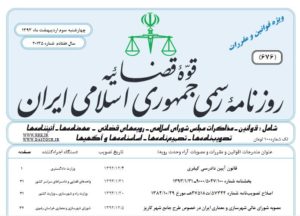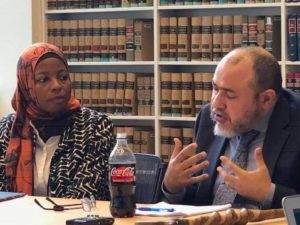
 Sharī ʿa vs. the Constitution: Ex Ante Judicial Review of Iran’s New Criminal Procedure Code Student editor Marzeh Tofighi Darian considers the recent jurisprudence of Iran’s Guardian Council – the legislative-cum-judicial body in Iran tasked with assessing the compliance of state law with Islamic law and with the constitution. Iran’s parliament recently adopted a Criminal Procedure Code 2014 (amended in 2015). Tofighi Darian examines the Guardian Council’s ex ante review of Iran’s 2014/2015 draft Criminal Procedure Code to illuminate the scope of the Council’s jurisdiction and its role in Iran’s legislative process. She outlines the range of strategies that the Guardian Council takes upon objections to proposed articles: (1) declaring draft articles generally invalid, (2) declaring draft articles to be “in violation of the Constitution,” and (3) declaring draft articles to be “in violation of sharīʿa .” Upon review, it turns out that, in most instances, the Guardian Council issues its rulings without citing sources—neither those “of Islamic law or sharīʿa , nor the Iranian Constitution as justification.” Moreover, most objections fall into category 3 – violations that it understands “to be against sharīʿa .” Arguably, there are negative long-term implications for Iranian legislation and legitimacy if the Guardian Council continues to invalidate parliamentary-drafted laws on the basis of sharīʿa but without a state rationale. The practice enlarges the role of Muslim jurists beyond the revolutionary constitutional mandate, and it raises serious questions for the institutional legitimacy of both parliament and the Council. Read more. Image credit: Wikipedia
Sharī ʿa vs. the Constitution: Ex Ante Judicial Review of Iran’s New Criminal Procedure Code Student editor Marzeh Tofighi Darian considers the recent jurisprudence of Iran’s Guardian Council – the legislative-cum-judicial body in Iran tasked with assessing the compliance of state law with Islamic law and with the constitution. Iran’s parliament recently adopted a Criminal Procedure Code 2014 (amended in 2015). Tofighi Darian examines the Guardian Council’s ex ante review of Iran’s 2014/2015 draft Criminal Procedure Code to illuminate the scope of the Council’s jurisdiction and its role in Iran’s legislative process. She outlines the range of strategies that the Guardian Council takes upon objections to proposed articles: (1) declaring draft articles generally invalid, (2) declaring draft articles to be “in violation of the Constitution,” and (3) declaring draft articles to be “in violation of sharīʿa .” Upon review, it turns out that, in most instances, the Guardian Council issues its rulings without citing sources—neither those “of Islamic law or sharīʿa , nor the Iranian Constitution as justification.” Moreover, most objections fall into category 3 – violations that it understands “to be against sharīʿa .” Arguably, there are negative long-term implications for Iranian legislation and legitimacy if the Guardian Council continues to invalidate parliamentary-drafted laws on the basis of sharīʿa but without a state rationale. The practice enlarges the role of Muslim jurists beyond the revolutionary constitutional mandate, and it raises serious questions for the institutional legitimacy of both parliament and the Council. Read more. Image credit: Wikipedia
 Iranian Criminal Procedure Code (2014) After several revisions made to the original Criminal Procedure Bill in answer to rulings by the Guardian Council, the Iranian Criminal Procedure Code became final and entered into force in 2014, with amendments in 2015. Read more. Image credit: Iranian Parliament/SHARIAsource
Iranian Criminal Procedure Code (2014) After several revisions made to the original Criminal Procedure Bill in answer to rulings by the Guardian Council, the Iranian Criminal Procedure Code became final and entered into force in 2014, with amendments in 2015. Read more. Image credit: Iranian Parliament/SHARIAsource
 Professor Khaled Abou El Fadl on “Islamic Law in an Age of Fear” On October 1st, 2018, Professor Khaled Abou El Fadl spoke to a gathering of around 40 students and scholars at Harvard Law School for a SHARIAsource lunch talk entitled “Islamic Law in an Age of Fear.” He discussed themes from his most recent book, Reasoning with God , focusing on the widening epistemological gaps between historical practice and modern consciousness. “The more law stops making sense to its audience, the more law has to resort to apologetics to legitimize itself … inflating its own legitimacy at the expense of social reality [and] the more it moves towards a coercive system,” (paraphrased) Abou El Fadl proposed. The event was livetweeted. More is to come when SHARIAsource releases a new podcast series with an episode featuring Professor Abou El Fadl and ILSP Visiting Fellow Mariam Sheibani. Image credit: ILSP: SHARIAsource
Professor Khaled Abou El Fadl on “Islamic Law in an Age of Fear” On October 1st, 2018, Professor Khaled Abou El Fadl spoke to a gathering of around 40 students and scholars at Harvard Law School for a SHARIAsource lunch talk entitled “Islamic Law in an Age of Fear.” He discussed themes from his most recent book, Reasoning with God , focusing on the widening epistemological gaps between historical practice and modern consciousness. “The more law stops making sense to its audience, the more law has to resort to apologetics to legitimize itself … inflating its own legitimacy at the expense of social reality [and] the more it moves towards a coercive system,” (paraphrased) Abou El Fadl proposed. The event was livetweeted. More is to come when SHARIAsource releases a new podcast series with an episode featuring Professor Abou El Fadl and ILSP Visiting Fellow Mariam Sheibani. Image credit: ILSP: SHARIAsource
See the full newsletter.

